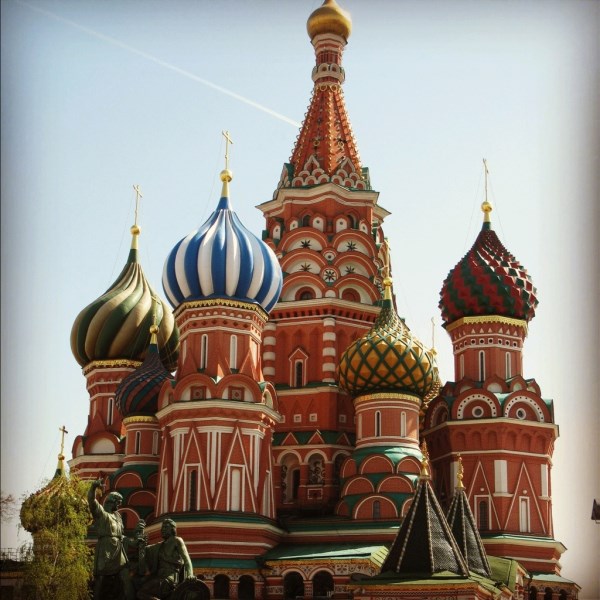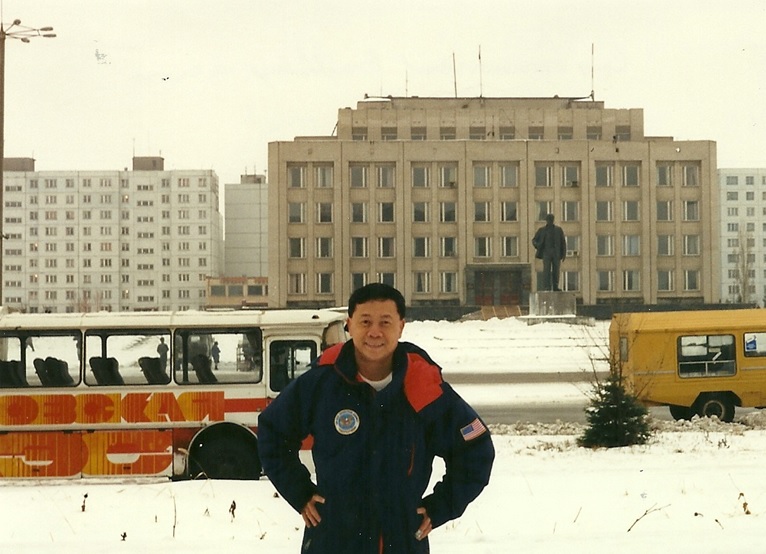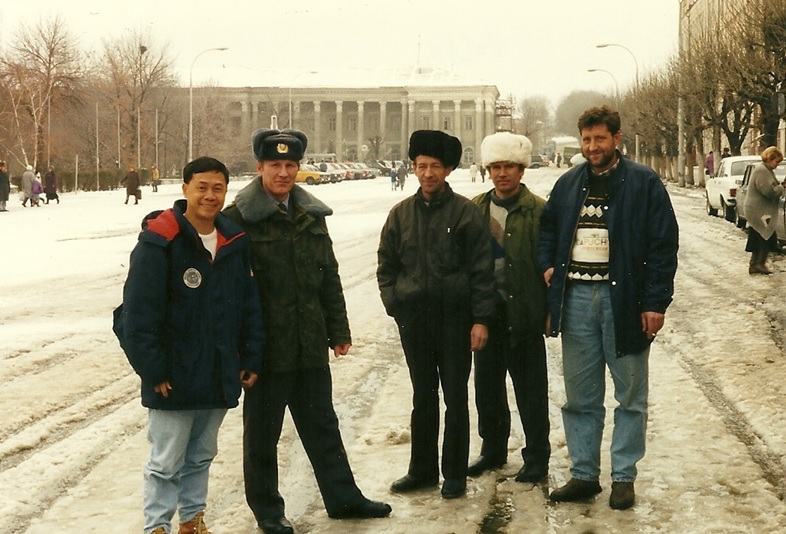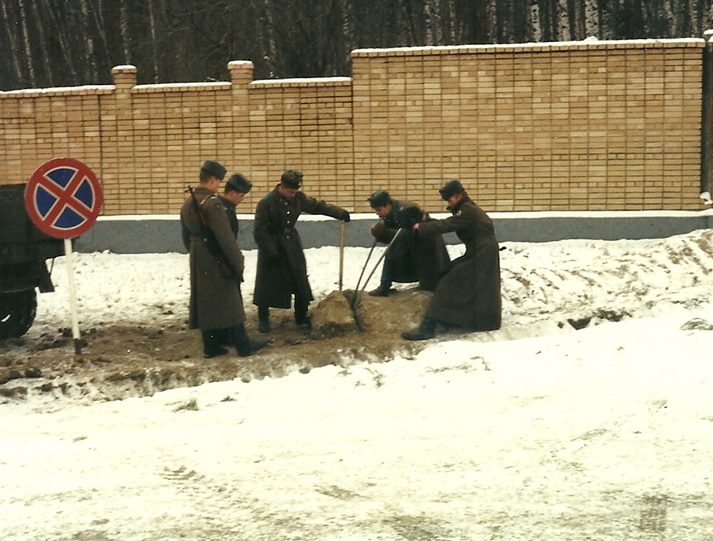




Tìm Kiếm Bài Đã Đăng
Loading

Duong Nguyen, MC
Colonel (Ret.), USA
Colonel (Ret.), USA
Diễn Đàn Cựu Sinh Viên Quân Y
© 2013
© 2013
It was November 1994.
Life is full of unexpected events, at least my life is. Forty years ago I was a lad playing on the streets of Hanoi, North Vietnam, amid the crumbling of the French Indochina Empire. The guns of Dien Bien Phu were nearby. Almost twenty years ago I was one of the many South Vietnamese officers who escaped the onslaught of the North Vietnamese communists during their final assault in Saigon, South Vietnam.
I had been fighting against the North Vietnamese Army and their masters, the Soviet Army. If someone told me that one day I would be a U.S. officer inspecting a Russian military research facility, I would say “Are you nuts?”
I was in my Washington, D.C., office when the telephone rang. “You are to be the team doctor of a 15-man inspection team to go to Russia”. The inspection was a fall-out of the Cold War in which the United States and Russia agreed through the Wyoming Memorandum of Understanding to conduct mutual inspections of their respective research and development of chemical facilities.
Although I had received inspection training months earlier, I still was not prepared. My first reaction was like an electric shock. Regaining my composure, I asked when I would be leaving. Next week was the answer. Again another surprise because it will be close to holiday season (again it was November).
I had an uneasy sense of pleasure and fear of the unknown at the same time. After rearranging my schedule, I showed up at the inspection agency a couple of days later for instructions and training. The trip into Russia began.
After another week in Germany for inventory preparation and further training, the team was now ready to enter Russia. As the team doctor, I gave a pitch on health and safety tips. “Eat steamy foods and drink only bottled water”. I warned.
Although I was prepared mentally for the cold weather in Moscow, which was around 20 degrees compared to the 60 degrees in Washington, I was greeted with freezing cold when I stepped out of the U.S. Air Force C-130. No doubt Napoleon’s Foreign Legion and the Third Reich’s Army were defeated here, I murmured to myself.
An advance team of escorts in their ubiquitous Russian hats greeted us. Having fought all my life against the communists in Vietnam and their Soviet masters who were portrayed as evil, I nevertheless remarked to one of my team members, “They are like us, they have two eyes, one nose, a mouth.” I could not see their ears because they were wrapped up inside their furry hats. I experienced conflicting emotions at the same time: hate and excitement and fright and triumph.
My team was herded into an airport restaurant and treated to its first Russian meal. The first course was a 2-inch piece of cooked beef inside a see-through coffin of jello. Being hungry and after reassuring myself that this piece of beef was cooked, I attacked it and consumed it rapidly. A team member later admonished me jokingly: “I did not see any steam coming out from the beef and you ate it!” Naturally, I did not eat the salad plate offered as a second course which consisted only of a sliced tomato. The main course was a piece of greasy meatloaf with cooked lentil-like beans and a side dish.
Back at the hotel, I brushed my teeth with the bottled water brought with the team. I looked carefully inside the bed sheets and under the bed/table/chairs and found no bugs, natural and artificial. We were told to check microphones vestigial compliments of the Cold War. (We were told also not to discuss sensitive matters while in our room). Reassured, I went to bed.
The team was assembled and transported to a Russian military airport which was about one hour away from the civilian Sheremetyevo Airport. The weariness from the physical labor of carrying heavy supplies and equipment was repeated from the sixth floor of the hotel to the truck to the plane.
The weather changed from a clear sky at 11:00 am to inches of snow at around 2:00 pm. The Aeroflot took off finally at 2:30 pm and brought us to the inspection site. On board, I was apprehensive. The airplane was well-known for crashes because of unsafe practices. For example, while in flight, the pilots and the flight attendant let us roam inside the plane, the seat belt order was not enforced and the cockpit door was open for everybody to stop by. It was with a sigh of relief when the team landed two hours later at a small airport.
We were lodged in another hotel which surprisingly was cleaner and more modern that the one in Moscow. Later we were told that the whole floor where we stayed had been renovated. The hotel manager had expected to get U.S. dollars. Later they discovered that they were paid by the host escort team in the daily devaluating rubles rather than U.S. greenbacks. No wonder the wide smiles that they welcomed us degraded to a mere grimace the next day when they saw us! And it is not the end:
Small amenities such as clean towels, packaged plastic combs or toilet soap bars were withdrawn from our rooms. Water was running irregularly some days. My room had no cold water, only the scalding hot dripping water. Other team members’ rooms had no hot water at all, only cold water. Was it the way to economize, to save water?
From the hotel we were bused to inspection site which was about 1 ½ to two hours away, depending not of the traffic but of the thickness of the snow and the bumpiness of the road. The bus was led by a police car with blinking lights which were the only blinking lights in town beside the traffic lights (no neon lights ads). The policemen were officers, captains or senior captains. I was told that the Russians did not trust or use their noncommissioned officers (NCO) to do the same job that a U.S. NCO would do.
On site again I discovered the same unattractive toilet room in a completely unventilated closet. Each trip to the toilet was an appalling adventure.
Some seemed to eat less, including myself, avoiding ubiquitous greasy Russian meat and sanitarily doubtful vegetables. Fruits were scarce, one banana was offered one time, the other times tiny apples -crap apple size- were the fruit of the day. I successfully avoided using the toilet for many days until the last day following a farewell dinner.
For water, the team was offered bottled water during meals but many times bits of sediments were inside the bottle, even in the unopened bottled water. These situations forced us to use our own supply of bottled water and military MRE (Meals Ready to Eat). There was a silver lining: as days passed, we had fewer and fewer boxes of supplies to load and unload.
During the inspection, I had the honor of being the first American doctor who set foot in a local hospital serving a population of about 6,000 people. I was dismayed to discover that the hospital condition was similar to a South Vietnamese hospital in Saigon 20 years ago and Vietnam was a third-world country!
I demonstrated to my medical counterparts the portable Advanced Cardiac Life Support (ACLS) equipment which included an up-to-date defibrillator capable of delivering shock therapy for heart attacks and at the same time running EKGs (electrocardiogram or heart tracing). “Where was the EKG machine?” my Russian colleague kept asking me. The Russian was thinking of a separate machine on a cart that they used to have. With the portable vacuum aspirator and the ventilator for artificial respiration, it seemed to them like they were in a “Star Trek” TV show.
During my contact with the medical authorities on site, I distributed key holders with a transparent plastic box containing a condom to promote the prevention of AIDS and STD (sexually transmitted diseases). The boxes carried one of several messages: “The enemy is near”, “Take over” or “Use me”.
It was a hit among my counterparts; they laughed at it. It was a subject of joyful discussion among them. It also opened a lot of doors for me: I was a chum for them. My job was easier: my requests were greeted with approval and with genuine smiles.
The daily bus trip back and forth from the hotel to the site was monotonous except from the noise of the bumpy road and the loud music turned on by the bus driver. The landscape was depressing: bare trees on an empty land covered with a blanket of snow.
When passing through a town, the picture was almost the same: high-rise apartment complexes were everywhere, only a few dilapidated single wooden houses now and then. Snow-covered black Lenin statues adorned government buildings.
People also were monotonous: they wore the same dark coat with furred hats having the same color as their dark shoes. “If you went into a clothing store, you will find the same types of clothes with identical color. Only the size is different.” I was told. In front of one government building I saw 5 soldiers trying to remove a piece of stone (in the U.S. a bobcat removal truck would have been called for).
These dark and somber silhouettes, walking on a snowy landscape, looked like a déjà vu Orwellian scene. There were no blinking advertisement lights on the streets; obviously there were no attractive entertainments places to go.
People were spending their time off-work drinking vodka, playing cards and you guess it drinking vodka! No doubt there is a high incidence of alcoholism in Russia.
I thought: How come a big country like Russia with enormous resources and vast land can be so depressing?
The return trip was a string of excitements: the team was offered a tour of a nearby town. They were guided through a museum, a music conservatory (Russian ballet is dearly engrained in their culture) and watched a Russian wedding with the unique Russian custom of newlyweds kneeling and praying at the local Tomb of the Unknown Soldier. Our hosts were nice and were genuinely trying to show their hospitality.
Again the team boarded an Aeroflot plane back to Moscow after a long delay. Meals in the plane consisted of a lunch box with one boiled egg, a sandwich, a plastic-wrapped lettuce and one now-very-familiar tiny apple. No preflight safety briefing was given, safety belts again were not used and emergency oxygen lines were nowhere to be seen.
In Moscow they gave us a 15-minute sight seeing of the Red Square. Photos were taken at the St. Basil’s onion cathedral. A quick visit was arranged for the team to see the wax-like cadaver of Lenin (which I declined).
We boarded again an Aeroflot back to Frankfurt, Germany, with the same safety experience. At arrival, a forklift arrived and carried our heavy equipment and luggage away. “Thanks to the American technology” one team member said: they did not have to strain their backs anymore.
In retrospect, I was thankful of having been associated with such a highly qualified and motivated team. They worked long hours, over weekends and holidays, suffered constant sleep deprivation, were underfed sometimes but they were highly charged, dedicated and patriotically motivated citizens. Thanks to them: there were no calamity incidents, no chemical casualties in a foreign soil far away from their families.
It was in 1994, just five years after the fall of the Berlin wall, I have no doubt that in the present time Russia is more modern and more advanced than the immediate post communism period.




















